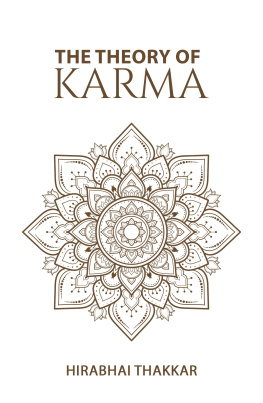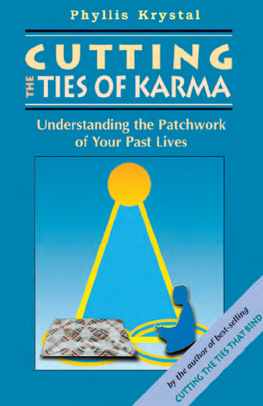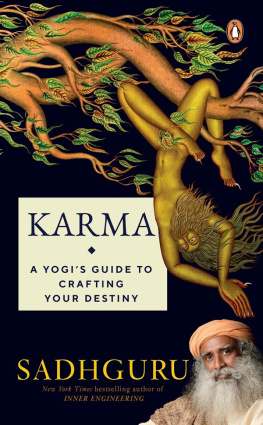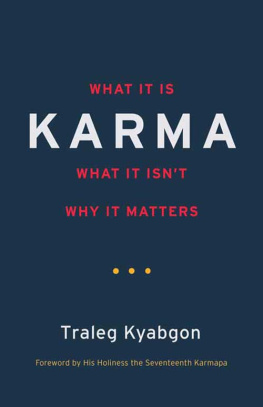Hirabhai Thakkar - The Theory of Karma
Here you can read online Hirabhai Thakkar - The Theory of Karma full text of the book (entire story) in english for free. Download pdf and epub, get meaning, cover and reviews about this ebook. year: 1988, publisher: Vibhatsu, genre: Science. Description of the work, (preface) as well as reviews are available. Best literature library LitArk.com created for fans of good reading and offers a wide selection of genres:
Romance novel
Science fiction
Adventure
Detective
Science
History
Home and family
Prose
Art
Politics
Computer
Non-fiction
Religion
Business
Children
Humor
Choose a favorite category and find really read worthwhile books. Enjoy immersion in the world of imagination, feel the emotions of the characters or learn something new for yourself, make an fascinating discovery.
- Book:The Theory of Karma
- Author:
- Publisher:Vibhatsu
- Genre:
- Year:1988
- Rating:5 / 5
- Favourites:Add to favourites
- Your mark:
- 100
- 1
- 2
- 3
- 4
- 5
The Theory of Karma: summary, description and annotation
We offer to read an annotation, description, summary or preface (depends on what the author of the book "The Theory of Karma" wrote himself). If you haven't found the necessary information about the book — write in the comments, we will try to find it.
The Theory of Karma — read online for free the complete book (whole text) full work
Below is the text of the book, divided by pages. System saving the place of the last page read, allows you to conveniently read the book "The Theory of Karma" online for free, without having to search again every time where you left off. Put a bookmark, and you can go to the page where you finished reading at any time.
Font size:
Interval:
Bookmark:
| The Theory of Karma |
| Hirabhai Thakkar |
| Vibhatsu (Jun 1988) |
Theory of Karma by Hirabhai Thakkar. 1989 paperback reprint (edition of 2500).
The
Theory of Karma

Hirabhai Thakkar

This book is
compiled & gifted to book-lovers by
Vibhatsu
Shri Hirabhai Thakkar (1918-2001) was an eminent preacher and author who devoted his life to the study of Vedic philosophy.
Through this website we hope to make Shri Hirabhais work accessible to the public.
At present, we offer an English translation of two classic works written by him - Mrityu Nu Mahatmya and Karma No Siddhanta (Theory of Karma).

Gahana Karmano Gatihi
The track (gatihi) of KARMA (action) is mysterious (gahana).
L ord Shri Krishna has himself proclaimed in Geeta that it is difficult to understand the intricacies and indefinite extent and shape of Karma (Action), as it is so complicated, intricate, zigzag, unfathomable, dynamic, inscrutable and mysterious because the life is such. The trail of Karma (Action) is jagged and intractable.
Shri Sudama, a friend of Lord Krishna says about the complex nature of Karma as under:
The working of Karma seems so complex. We two, the students of the same Guru (Teacher). He (Krishna) became the king of this earth. While I have nothing even to eat.
He used to play with monkeys in Gokul. And used to fetch wood at teachers house.
Now he sits on the throne today ,While I possess only a begging bowl and a stick in hand.

The Law of Karma (Action)
A s we know, for running the administration of any department or institution in this world, certain laws and rules are required to be framed for its smooth and efficient day-to-day working.
As for example, the Railway Department has got its own strict laws and rules, Aviation Department, Revenue Department, Income Tax Department, Judicial Department, Public Works Department and all other such Departments have their own rules and regulations for their smooth and efficient administration. Even a small Village Panchayat, Taluka Panchayat or District Panchayat or a Municipal Corporation or a big State or a Country Government - each one of them has got its own separate laws and rules under which it is governed.
In the same way, there must be some law which governs the administration of this whole, vast, infinite universe.
The rising and setting of the sun in the east and the west punctually and strictly according to the time shown in Astrology, the harmonious movement of the earth, sun, moon, stars, planets etc. around each other on their pre-destined orbits and destined routes as shown in Astronomy, the Inception, Maintenance and Dissolution of all the animate bodies and inanimate objects and things in the whole universe, the coming of winter, summer and monsoon seasons, the ripening of fruits, flowers, grass and shrubs on the earth, the proper existence of mountains, rivers, oceans etc., the working of the principles of specific gravity and relative density of objects and things on the earth, the evaporation of water from the sea to the sky, the formation of the clouds and their showering on the earth, the mysterious running of the cycle of birth and death etc. for the smooth and effective administration and execution of all these environments, there must be some strict law under which the whole infinite universe is governed.
This law is known as the Law of Karma as stated by Goswami Tulsidasji in his Ramayana as under:
KARMA PRADHAN VISHVA RACHI RAKHA,
JO JAS KARAI SO TAS FAL CHAKHA.
The whole universe is governed by the Law of Karma and the most important section and the fundamental principle of this law is
JO JAS KARAI SO TAS FAL CHAKHA.
As you sow, so shall you reap.
Thus the Law of Karma is the law of
- action and reaction
- cause and effect
- effort and destiny.
Action and reaction, cause and effect, effort and destiny are all equal and opposite.

Distinct Features of the Law of Karma
T he main and distinct features and the important characteristics and criteria of the Law of Karma are as under:
- This law is Eternal: It has come into force with effect from the date on which the sun started rising in the east since the inception of the universe and it will remain in force till the end of the universe, the date on which the sun will stop rising in the sky. (These dates are not known and will never be known to anybody.)
- This law is Universal: It is applicable to one and all the persons and creatures in all the countries in the world and the entire universe.Not that it is applicable only to Indians and that too only to Hindus because it was repeated and recited by Lord Krishna in Bhagwad Geeta on the battle field of Kurukshetra in India. It is applicable to all people from the human races, castes and creeds in the whole world.
- This law is Applicable: In all the generations and eras of earthly cycles, Satyug, Treta, Dwapar and Kaliyug and in all the centuries - past,present and future.
- This law is Totally Perfect: There has not been a single amendment in the law up-till now since time immemorial and there is not going to be a single amendment in the law till the end of the entire universe. There is not a single proviso in the law. There is no such mention or words like Provided that or Not withstanding anything contained in the Act etc.
- There is Not a Single Exception: In this law of Karma, nobody can escape the canons of this law. Even the father of Lord Rama (incarnation of the omnipotent, omnipresent, omniscient God) could not escape his destined death due to the forced separation of his son Rama. Shri Rama also in due respect to this law, did not interfere by giving extension of life even to his own father Dasratha at least for fourteen years till his return from exile. The omnipotent formless (NIRAKAR) God, once incarnated in the human form (SAKAR) as Rama, he too had to humbly respect and obey the Law of Karma and he did not show any favouritism or partiality to anybody,even to his own father.
The most important section of the law is :
JO JAS KARAI SO TAS FAL CHAKHA.
As you sow, so shall you reap.
The application of this law is beyond manipulation, intervention or corruptibility.
The wrong doer will definitely be punished for his wrong deeds. Nobody can escape the penal provisions of this law. There is no escapement and no exception is allowed in its application. Similarly a pious man performing good actions will definitely be rewarded for his good deeds.
Each and every good or bad action will have equal and appropriate reaction and will invariably rebound on the doer attracting just reward or punishment.

Paradox in Law
H owever, in this world, even with a cursory observation around us, we find that so many wrong doers, black marketeers, corrupt and crooked persons, smugglers and similar other dangerous mischief mongers and dishonest persons are merrily enjoying all the amenities in life.
Font size:
Interval:
Bookmark:
Similar books «The Theory of Karma»
Look at similar books to The Theory of Karma. We have selected literature similar in name and meaning in the hope of providing readers with more options to find new, interesting, not yet read works.
Discussion, reviews of the book The Theory of Karma and just readers' own opinions. Leave your comments, write what you think about the work, its meaning or the main characters. Specify what exactly you liked and what you didn't like, and why you think so.









